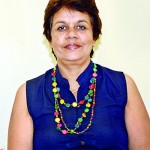Strengthening early education
Charmian Colombage sees the Montessori system as a deep philosophy involving the application of many scientific disciplines. Therefore, in a country inundated with mushrooming Montessori schools and many questions about the standards of Montessori education, Charmian being awarded the Silver Medal by the Women’s Chamber of Commerce and Industries recently augurs well for this field of early learning. She won the Medal for Entrepreneurship on the strength of her contribution towards Education.

Charmian Colombage
Charmian, who has been directing her efforts towards the promotion of the Montessori system of education in Sri Lanka abiding strictly to the Montessori system, is saddened by the fact that Montessori education today has become big business. Those who run schools should not lose sight of the purpose of Montessori teaching while the necessary ambience should be there in the school for the child to learn in his most formative years, she says.
Running her school “Stepping Stones” at Pita Kotte and another at Rathgama for tsunami-affected children she says, is almost a spiritual experience. At the Rathgama school funded by Bumse – a Swedish company, the educational needs of the children are provided free as they come from poor backgrounds, broken homes or troubled families. Designed by architect Jeevaka de Zoysa, the school is built on forest land of a Buddhist temple and has the perfect setting for its 65 students. During the two years of construction, Charmian trained seven teachers from the surrounding areas and even today, they come to her for further training,
Charmian learnt the Montessori system of education from Shymini De Zilva at Woodland Training Centre and later joined Joyce Gunasekere’s school. She found herself in the deep end when she began teaching in a tiny “bush school” in the remote village of Oshobo when she was in Nigeria with her family. The school was run by a few Catholic nuns for poor kids but lacked working material. Charmian turned out the educational aids herself and found teaching those eager children, extremely rewarding.
Two years later, when the family moved to Australia, she taught in one of the most advanced Montessori schools in Sydney. Her ten-year spell at this school enabled her to learn the system in depth and she calls her trainer Carmen Parker the driving force in her life.
Back in Sri Lanka, she had her hands full with her growing sons but as domestic responsibilities lessened, the urge to teach resurfaced. In 2003, she launched her own school “Stepping Stones” with a three-year curriculum designed for the 2-5 year age group.
The benefits of starting Montessori education early are evident says Charmian. Homes, the backgrounds, values of kids vary and they learn to cope with these variations from one another early in life. Counselling, whether health or spiritual, is included in her school. Counselling is also extended to parents with whom a broad vision on the child’s education is shared. Charmian has just included in her curriculum a programme which educates the teachers and parents on peaceful co-existence.
Charmian also holds training camps which have encouraged rural women to take to Montessori teaching, some conducted by Australian Trainer Carmen Parker. The 5-day residential workshops held in Batticaloa in 2008 and 2010 along with the People’s Church were attended by 30 teachers of the East. She hopes she could hold similar workshops in the North as well.
Charmian has plans of setting up a Montessori Teacher Training School as she had watched the results at Rathgama where the teachers she had trained are truly dedicated.
The lack of a national policy on Montessori Education in Sri Lanka is a serious lapse, she feels. Charmian is planning to write a book which will provide guidelines for teachers and schools titled “Early Childhood Policy” which will interalia incorporate our cultural practices, aspects of psychology and essential requirements that every school should have. These include open spaces, ventilation with the number of toilets specified going by the number of students in the school. The book once published will be handed over to the government and the relevant departments and will be made available for schools and teachers.
Her kindergym which she has introduced to her school and which she conducts twice a week at the SSC for kids from one and a half years to five years emphasises the principle that movements stimulate the brain. She has a range of child-safety equipment designed to develop cognitive actions and movements. The movements are based on musical themes. These she says are ideal for all kids and especially for kids whose crawling, walking and other movements are delayed. Charmian is accredited to the New South Wales Gymnastic Association and had been trained in kinder gymnastics.
The granddaughter of Sir Earnest De Silva and the great grand daughter of the famed Henagama Appuhamy who made the largest donation of Rs. 250,000 – a princely sum at the time, towards the restoration of the Ruwanveli Seya during the British period. Charmian descends from families of philanthropists on both sides. Charmian says that her parents’ families who owned large estates unfailingly set up schools on each of these estates where teaching as well as all schooling material were provided free of charge. Deva Pathiraja School in Rathgama, for instance, which produced sportsmen such as Lasith Malinga was set up by Charmian’s father. Schools were located on the Koshena estate at Sandalankava, Salawa estate in Avissawella, Raththota estate in Bingiriya and Henagama estate in Akuressa. Veluvana Vidyalaya in Dematagoda was built by her great-grandmother all of which today are state-run schools.
Times however have changed and Charmian says that although her generation cannot afford to extend the same generosity and benevolence as her ancestors, she will strive to continue the spirit of promoting education as best as she can.


